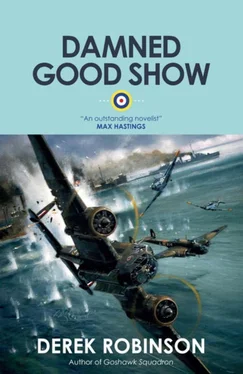“Forget Porthcawl. Forget the bombing range. Have a cup of coffee and a nice piece of cake. I know the way home. Watch out for factory chimneys.”
Gilchrist drank coffee and looked at factory chimneys. Their smoke was streaming toward Lincolnshire, so the wind was from the southwest. But the meteorological officer had told him the predicted winds were southeast. He had made his course-corrections on the assumption that the airplane was being blown west, when all the time it was being blown east. So his corrections had pushed it even further east.
That night, in the Mess, he bought Duff a beer. “I made a pig’s ear of that, didn’t I?” he said.
“Things always go wrong. That’s the first rule of flying.”
“Everything went wrong. You made sure of that.”
“I get bored easily,” Duff said. “It’s my fatal flaw.”
Word of Gilchrist’s unhappy afternoon soon spread around the squadron. Pug Duff’s flight commander, Tom Stuart, sent for him. “That wasn’t a very nice thing to do, Pug,” he said.
“I agree, sir. I’m not a very nice person.”
“You may well have destroyed Gilchrist’s self-confidence.”
“Good. If he’s so fragile, he deserves the chop.”
“No, I’m not going to recommend that.” Stuart cleaned his fingernails with a paperknife. “When you came here, I took you to be a fairly decent sort. Now you’re developing a thoroughly vicious streak. Keep it up, Pug, and you’ll be a flight lieutenant in no time.”
“Good show,” Duff said.
3
Flight Lieutenant McHarg got into his Bentley and had a severe shock. The driver’s seat had been adjusted to suit someone with shorter legs.
Of course that could have been done by Sergeant Trimbull, or one of his mechanics. No it couldn’t. McHarg had a deal with Trimbull. From time to time the sergeant was allowed to fire a machine gun in the butts, which were in a distant corner of the airfield. In return he kept the Bentley clean and polished, its oil, radiator and battery topped up, its tires properly inflated. None of that involved moving the driver’s seat.
McHarg restored it to its correct position and began looking for other irregularities. He found bits of gravel trapped in the tire treads, a couple of dead bugs on the headlamps. There was some unfamiliar mud on the underside of the rear springs. Now he was profoundly disturbed. He felt attacked, invaded, almost raped. Reaction set in at once. “Calm down, calm down,” he said aloud. Maybe, while he had the measles, some idiot mechanic had driven the Bentley around the aerodrome, maybe the car itself had not suffered. But he had to be sure. His hand trembled slightly as he turned the key in the ignition.
He drove out by the Main Gate and nursed the old girl up to fifty, went back down through the gears to walking pace, then accelerated again, keeping a check on the revs and the juice and the temperature. All went well. He relaxed, cruised around the lanes, came back to the base, reversed his lovely lady into her garage, gave the throttle a final burst as a sort of nightcap, and switched her off. He was hugely reassured, but not for long. The worst was saved for last.
McHarg always drove his Bentley sparingly. He kept a notebook in the car. After every trip, he recorded the distance covered. He took the notebook from the glove compartment and glanced at the mileometer reading. His heart lurched. Between his last listing in the book and the mileage on the dashboard, there was a difference of four hundred and seven miles. Deduct three miles for today’s road test. Some stinking bastard had stolen his Bentley and driven it more than four hundred miles.
He’d been counting dead bugs on the headlights while this proof was shouting for attention. He thrust the notebook into the glove compartment and his fingers touched soft leather. He pulled out a pair of ladies’ gloves. Very light. Very expensive. Very wrong.
Well, it had to be an officer. No NCO would dare. It had to be someone who’d gone on leave. That meant “A” Flight. He rapidly considered them all but he knew it was Silk because Silk had been so shifty, so twitchy, when he’d questioned him about the negligent discharge. And if it was Silk, it had to be Langham too. After eighteen years in the RAF, McHarg could smell conduct prejudicial to good order and discipline several miles away.
Silk and Langham. Went together like blood and thunder.
4
The war was becoming a bore.
Group HQ now required 409 to have six Hampdens on standby at all times: fueled, armed, bombed up, the crews kitted out and bored to tears by the sight of the inside of the crew room from dawn to dusk. “Shipping strikes,” Bins told them when they asked what the flap was about. But Group found no targets for them to strike. The war seemed a long way from Lincolnshire.
The Royal Navy got a bloody nose when a U-boat sneaked into Scapa Flow and sank a battleship. Nothing 409 could do about that. Too far north. Anyway, the navy had their own airplanes. President Roosevelt officially denied rumors that Americans would fight in Europe, so there must be some truth in them. Did America have any bombers? Nobody knew. All of a sudden Russia wanted a chunk of Finland, in order to protect Leningrad. Protect it from what? Was Finland about to invade Russia? Nobody knew. Nothing 409 could do about it anyway. Too far east. The only war that mattered was to the south, and nothing was happening there. The Frogs had their Maginot Line. Jerry had his Siegfried Line. One Line couldn’t attack another, so it was stalemate. Nothing 409 could do about that. The gramophone played “We’re Gonna Hang Out The Washing On The Siegfried Line.” Bloody silly song. Who was going to drive out the Hun? Not 409. With luck their two-hundred-and-fifty-pound General Purpose bombs might chip the concrete. Assuming they exploded. Someone dropped the gramophone record, smashed it, total obliteration, loud cheers. 409 had scored at last.
With half the squadron on standby, the other half did training exercises. They flew around England to improve their navigation. They flew to bombing ranges and aimed practice bombs at targets. They flew to gunnery ranges and fired at canvas drogues towed by obsolete aircraft. This was good for the crews but bad for the airplanes. After forty hours in the air, a Hampden needed a major service.
It worried the Wingco. The crews weren’t sharp enough, some of them treated the war almost as a joke, they needed to be pushed harder, given a good stiff jolt. But the war might take fire at any moment. Suppose—when it did—the hangars were full of Hampdens with Pegasus engines getting overhauls? 409 would be caught with its pants down.
Wingco Hunt rationed the flying training. That, of course, meant less work for everyone. Yet Bomber Command was still on full alert, and no aircrew were allowed off camp until sundown, by which time it was too late to go further than the village pub. A great deal of hanging around the Officers’ Mess took place. Nobody hung around more than Flight Lieutenant McHarg.
Maiming Silk and Langham had been his first impulse. For a day or two he lived in a hot reverie of revenge: he dreamed of beating them bloody with a coal-shovel; or smashing kitchen chairs over their heads, dozens of chairs, pounding the pair to their knees in a sea of splinters; or kicking them across the aerodrome until they rolled like logs and one final almighty boot sent them flying into a stinking ditch. Other fantasies involved whips. As a boy, in Glasgow, McHarg had often been whipped. His father whipped him, using the buckle end of his belt. Schoolteachers whipped him, using the tawse, which was the official instrument of punishment, forked like a snake’s tongue to enhance suffering. He knew a lot about how and where to whip people. What infuriated him was the sheer patronizing arrogance of these two. They had behaved as if they had a right to take anything they wanted. They had assumed he wouldn’t notice. If he did notice, they didn’t care. He was just the Armaments Officer. No better than the ghillie who carried the guns for the gentlemen stalking the deer.
Читать дальше












